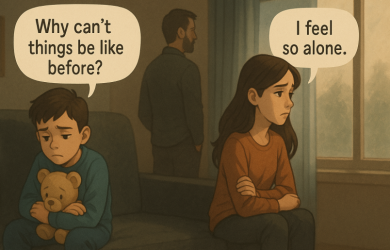Divorce and Mental Health: 14 Positive and Negative Effects

Unlock Daily 30-Sec Tips for a Happier Relationship
👉 Subscribe FREEKey Takeaways
Marriage.com AI Quick Summary
Divorce and mental health are deeply connected but not discussed with that intensity. Divorce can have a significant impact on mental health, both positive and negative.
The influence of marriage termination on mental health can vary from person to person, and factors such as the nature of the divorce, the support system, and coping mechanisms play a defining role.
In this guide, you can discover what good and bad the official end of relationships can deliver to you and get prepared accordingly. Let’s begin the discovery of how divorce and mental health are intertwined in the lives of many individuals.
How your mental health may suffer from your divorce
It is no secret that divorce is compared to the death of a close person and has a similar effect on your mind and heart.
Even if you apply all protective practices to get the best out of divorce and mental health, your marriage termination won’t go unnoticed without any traces on your life and emotional well-being. Explore the common negative impacts you may undergo as a result of divorce:
1. Emotional turbulence
Divorce often implies the end of a significant relationship, leading to emotional distress covering sadness, grief, anger, and feelings of rejection. Coping with these intense emotions in regard to divorce and mental health can be strenuous and may contribute to symptoms of depression or anxiety.
Your only way out in the scenario of divorce and mental health is to care about your support system. Apply protective practices, visit a therapist, and rely on your dear friends and relatives to diminish any negative impact the divorce-driven emotions may bring to you.
2. Stress and anxiety
The process of divorce itself can be stressful, covering legal procedures, financial adjustments, and changes in living arrangements. This stress can bring about elevated anxiety, which may surface as physical symptoms, such as headaches or gastrointestinal issues. This implies suffering both for your mental and physical well-being.
To prevent similar hardships you should plan your marriage termination well, counting preparing several alternative solutions for different changes and challenges.
Cover them one by one, taking into account your own and your family’s comfort. But remember to be flexible so that you don’t stress out when something goes out of your plans.
3. Self-Esteem concerns
The breakdown of a marriage and the implications of divorce and mental health can produce a strong and lasting effect on self-esteem and self-worth. Individuals may question their value and struggle with feelings of inadequacy or failure.
Partners may get surrounded by self-blame and negative perspectives on their role in divorce and its prerequisites.
Rebuilding a positive self-image after a divorce is often a defining aspect of recovery. This is a step you should never postpone. Otherwise, it will prevent you from a healthy move-on and postpone post-divorce stability and life satisfaction.
Work with relevant exercises and practices, get professional aid on the issue, and your self-esteem will heal, giving you a chance for positive changes after the official end of your relationship.
4. Financial strain
Marriage termination often results in financial changes for both parties. The economic challenges, covering adjusting to a single-income household or dealing with the distribution of assets and liabilities, can only amass stress and anxiety.
Cooperating with relevant specialists for the sake of financial stability while dealing with divorce and mental health can help you diminish the burden of divorce and its after-effects.
Plus, it is necessary to make quick decisions and prepare your financial buffer zone in advance so that you can meet all changes and challenges with confidence.
5. Social isolation
The end of marriage along with divorce psychological effects may drive changes in social circles, as friends and family may take sides or relationships may shift. Feelings of loneliness and social isolation can exacerbate mental health issues, as individuals may struggle to recreate their social support networks.
Here you can change the state of things only with your attitude to them. This implies accepting losing friends or relatives as your supporters as positive changes and welcoming new and better connections instead.
6. Parenting challenges
Psychological effects of divorce on adults can worsen in case children are involved resulting in unexpected divorce stress symptoms.
For those with children, divorce and mental health can accumulate unique stressors related to co-parenting, custody arrangements, and maintaining a steady relationship with the kids. Balancing the needs of children with the emotional toll of marriage termination can be particularly exhausting but necessary.
You should stick to the idea that divorce is a beneficial choice for your kids that guarantees less stress and commotion for them your unhappy marriage tended to produce. Set your children and your own wellness as priorities, and use your inspiration and enthusiasm for your family to prosper.
7. Elevated risk of mental health disorders
While not everyone who goes through a divorce experiences mental health issues, there is an elevated risk of conditions like depression and anxiety. Individuals with pre-existing mental health tendencies may find their symptoms exacerbated during and after a marriage termination.
So, if you already have some mental health concerns, you should closely monitor and address them when necessary in times of turbulence. This will be your defense from any kind of complications and aid you in going through divorce-related troubles more easily.
It’s significant for couples going through a marriage termination to reach out for support from friends, family, or in-field professionals. Although divorce is not guaranteed to break you mentally and emotionally, it can create a huge burden for you.
Take suitable precautions, nurture your physical well-being, and your mental health will be safe and sound even in case of divorce.
How your mental health may win from divorce
In certain situations, divorce may be a winning solution for you and your family. Even more, the decision to terminate your marriage may save you from mental and physical suffering and grant you a chance for a better life.
1. Post-traumatic gain
While marriage termination can be emotionally challenging, some individuals experience post-traumatic gain. This phenomenon involves personal development and positive changes in various areas of life after overcoming a significant life crisis. People may discover newfound strengths, resilience, and a deeper understanding of themselves.
To relish these perks, you shouldn’t be afraid of changes and challenges but exploit them instead to improve yourself and your life eventually.
2. Creative outlets and reinvention
The end of marriage and related changes can be a catalyst for self-discovery and reinvention. Some divorcees channel their emotions into creative outlets such as art, writing, or music.
You should not restrict yourself but dive into a long-forgotten activity of interest or the one you have always wanted to try out.
This process not only serves as a therapeutic release but also allows for personal growth and the exploration of new interests. As a result, you will have your personality and potential developed and enthusiasm and inspiration accumulated.
3. Reevaluation of priorities
Living through a divorce often prompts individuals to reapproach their life priorities. This can bring about a more authentic and intentional attitude to life, as people may become more attuned to their own needs, desires, and values, ultimately fostering a stronger sense of self.
The change of focus in the marriage termination can be your savior from personal deterioration and a chance for a better life you could never get unless you got divorced.
4. Enhanced independence
For some, divorce becomes an opportunity to rediscover and embrace their independence. Especially after abusive relationships people use their marriage termination as a chance to breathe freely and obtain full control over their own lives and decisions.
Learning to navigate life on their own terms can empower individuals, leading to boosted self-confidence and a sense of autonomy that can positively influence mental well-being. Such divorcees are expected to feel less stressed and tense without any negative impact from their ex and enjoy their life eventually.
5. New relationships and social connections
Divorce doesn’t necessarily mark the end of romantic possibilities. In contrast, it can open new and better opportunities for you when it comes to dating and building steady connections.
Now that you are more experienced, have learned your lesson after an unhappy marriage, and know what you want, it will be easier for you to make a successful choice.
In addition, many individuals find new, fulfilling relationships after divorce, resulting in increased social connections and support systems. Building new connections can contribute to a sense of belonging and improve mental health.
6. Educational and career advancements
Some individuals use the post-divorce period as an opportunity to concentrate on personal and professional development. Marriage takes much time and effort, making individuals sacrifice their career plans and aspirations. But when the marriage termination comes, you are finally free to invest in your career and educational development.
Pursuing higher education, career advancements, or entrepreneurial ventures can provide a sense of purpose and achievement, positively impacting mental health. So, similar changes are to bring the good for you.
7. Mindfulness and self-care practices
The marriage finalization can prompt a reevaluation of self-care practices. Many divorcees turn to mindfulness techniques, meditation, and other self-care activities to overcome stress and add to emotional well-being. These practices can invest in a more balanced and resilient mental state.
Guided meditation can help you heal emotionally after a divorce. Watch this appealing video:
The way forward
The impact of divorce is multifaceted, and people respond in diverse ways. While challenges exist, there is also potential for growth, resilience, and the creation of a more fulfilling life post-divorce. One should always strive to learn how to cope with divorce stress and related consequences.
Encouraging a positive mindset and embracing the opportunities for personal progress can contribute to a more interesting and transformative journey through this life transition.
 Tips
Tips
Write your tip or submit a video tip
All tips are reviewed before the publishing.
Share this article on
Want to have a happier, healthier marriage?
If you feel disconnected or frustrated about the state of your marriage but want to avoid separation and/or divorce, the marriage.com course meant for married couples is an excellent resource to help you overcome the most challenging aspects of being married.
Related Articles
Recent Articles
Related Quizzes
Unlock Daily 30-Sec Tips for a Happier, Healthier Relationship
👉 Subscribe FREE on YouTube We'd love your feedback!
We'd love your feedback!
 Expert Q&A
Expert Q&A
Ask your question related to this topic & get the support you deserve from experts.



















 Thanks for your feedback!
Thanks for your feedback!